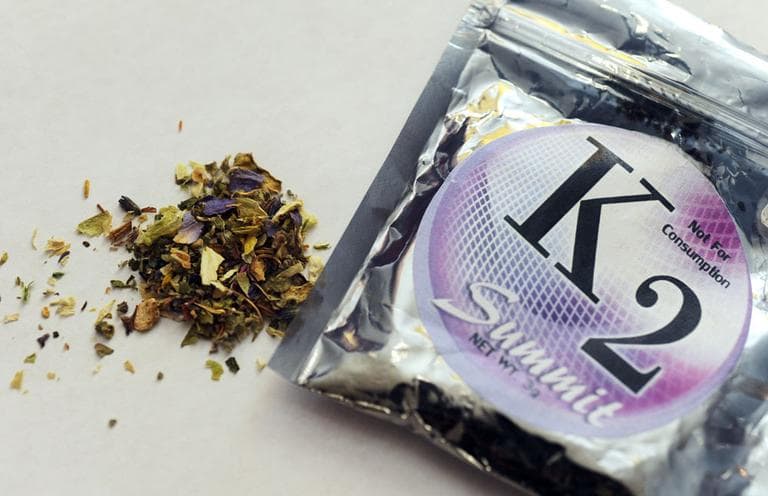Advertisement
Reports Of Dangers From Synthetic Marijuana Use Increasing

Many parents probably think they have a basic understanding of the illegal drugs their kids might encounter. But some synthetic drugs, designed to mimic marijuana and sold legally at many stores in Greater Boston, are causing big problems.
Here’s how 28-year-old Sue, from Somerville, who doesn’t want her last name used, describes what happened when she smoked synthetic marijuana.
"Everything was shaking. I had my heart just throbbing against my skin, it was moving so fast, and I couldn't breath,” Sue said. “It was like a psychedelic terror, if you will."
Sue says she's done illegal drugs before, but about a year ago, when she put the synthetic marijuana into a cigarette and smoked it, she immediately knew something was wrong.

"I felt this pressure in my head. I felt so heavy,” Sue said. “And I was sitting down, with my hands on my knees, and when I opened my eyes everything was moving, I was hallucinating, I could not move. I thought I was in hell.”
Sue and some friends smoked an amber powder called JWH-018, named after the scientist who developed the chemical. It is one of five chemicals recently placed under a federal ban. But there are hundreds of other chemical compounds that legitimate researchers have developed to mimic the effects of THC, the active ingredient in real marijuana.
Dr. Christopher Rosenbaum, toxicology professor at the UMass Medical School in Worcester, is studying these substances.
"They are research-grade chemicals that have been designed over the last 40 or 50 years, not in clandestine labs for abuse purposes,” Rosenbaum said, “They've been developed by pharmaceutical companies and organic chemists to better understand how marijuana interacts with the receptors in the human body so we can figure out how to harness the beneficial effects of marijuana."
Rosenbaum says these chemicals were neither intended for — nor tested on — humans.
"As you can imagine, if a pharmaceutical company can find that mix — where you provide the pain relief and anti-inflammatory relief [of marijuana] without the psychogenic effects — you're going to find probably the medication that probably replaces ibuprofen," Rosenbaum said. "If you know that, you must know they've been looking for this thing for a long time.
"In that pursuit, they've left hundreds, if not more, I'll say hundreds conservatively — of potential compounds in their wake."
Advertisement
The type and quality of those chemical compounds varies widely with reports that some synthetic cannabinoids are anywhere from two to more than 500 times stronger than THC.
[sidebar title="Number of calls to poison control centers in Mass. and R.I. for exposure to synthetic marijuana:" width="250" align="right"]
- 2010: 2,906 calls
- 2011: 6,959 calls
- 2012: 1,901 calls (as of 3/31/12)
Data courtesy the American Association of Poison Control Centers
[/sidebar]
Rosenbaum says because most of these chemicals don't show up on drug tests, fake pot is especially popular with those on probation, or those who are regularly drug tested. But he says more and more people are ending up in emergency rooms.
"The reports that we see have people complaining of agitation, paranoia, fast heartbeats, vomiting, some anecdotal reports of seizures and there are case reports of people having been exposed to what was purchased as a synthetic cannabinoid or herbal marijuana alternative and subsequently taking their own life,” Rosenbaum said.
There are few statistics on adverse effects from synthetic marijuana, although a national foundation established last year lists 23 deaths from the substances, either suicides or violent crimes, from what it says was drug-induced psychosis.
Karen Dobner of Illinois started the foundation To The Maximus after the death of her 18-year-old son, Max. He drove his car at 100 MPH into a house after smoking fake pot that he bought at the mall.
"I had never heard of it in my life. A year ago, none of my friends knew what it was, didn't even hear of it," Dobner said. "Yet it was sold at all the tobacco shops, gas stations and convenience stores in our town."
It appears that synthetic marijuana is relatively easy to get if you know what you're looking for. There is no age restriction to buy it and a gram costs about $30. It's usually called incense and labeled "not for human consumption."
In one Boston-area head shop, I watched as a young person asked for "smokeable incense" — another name for synthetic marijuana. There were no signs that it was sold there and it wasn't displayed but the clerk readily replied, "Yep. We've got Nice Guy, Sin and Mary Joy," and he reached under the counter.
The formerly popular brands known as K2 and Spice are not as widely available since the federal ban. Synthetic marijuana is also marketed and sold online and there are do-it-yourself videos instructing people how to make their own.
Congress is considering a nationwide ban on synthetic cannabinoids. At least 40 states have issued bans and the other states are taking steps to regulate it.
In Massachusetts, there are three bills pending related to synthetic cannabinoids. State Rep. Liz Malia, House chair of the Mental Health and Substance Abuse Committee, says keeping up with fake pot is like an endless game of tag for policymakers and police.
“If you understand that this is, sort of, what human behavior is looking for then you can do a lot of things. They keep coming up with new forms, that's really scary,” Malia said.
And with the synthetic marijuana market estimated to be worth some $5 billion a year, it’s likely the game of tag will continue.
